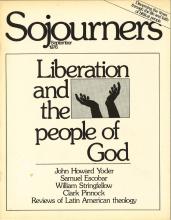Because we must hear and obey the word of God in a specific context, many Christians are seriously asking after the divine command for them in a world largely poor and hungry. A "theology of liberation" is in the air. Latin American and black theologians have pressed for a radical understanding of what it means to do the truth in a situation of oppression and suffering. We dare not, as Hugo Assmann has warned us, reduce their efforts to a "consumer product," a new toy on the theological playground of affluent, Western thinkers. Instead we are summoned to enter into the same struggle, to hear the word of God ourselves in a world of poverty and dire distress.
Evangelicals have often been rather more inclined to defend the gospel than to practice it. Yet a defending of the gospel which is not matched by a living of it is hollow and inauthentic. The "theology of liberation" is in reality God's instrument for the refinement of our own commitment to the gospel, and has led many to reflect on the need for the liberation of North American Christians. Before issuing such a call, there is a theological assumption to be stated and accepted. All believers in Jesus Christ have been summoned to a life of radical discipleship, oriented to his cross (Mark 8:34). Although the point is familiar and obvious, grounded in the most certain and lucid commands of our Lord himself, it is here that many of us become stalled. We do not wish to think that the gospel might have radical, life-changing implications for the entire range of our existence. Nevertheless, according to the New Testament, it most certainly does.
Read the Full Article

